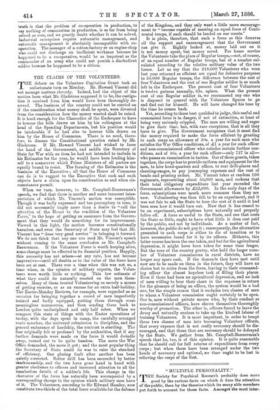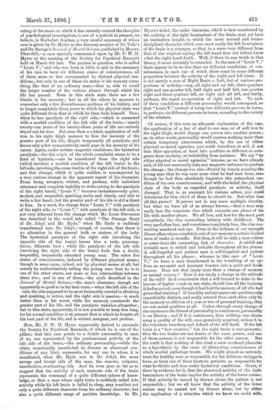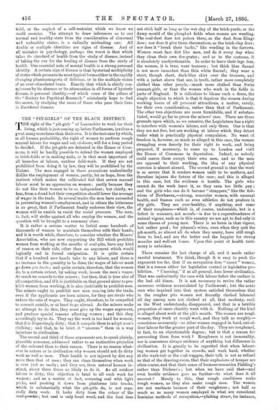" MULTIPLE PERSONALITY."
THE Society for Psychical Research probably does more good by the curious facts on whioh it fixes the attention of the public, than by the theories which its many able members put forth to account for those facts. Amongst the most inter.
eating of the cases on which it has recently centred the thoughts of psychological investigators, is one of a patient at present, we believe, in Rochefort Asylum, a very careful summary of whose case is given by Dr. Myers in the January number of Dr. Take's and Dr. Savage's Journal of Mental Science, published by Messrs. Churchill,—a case specially commented upon by Mr. F. W. H. Myers at the meeting of the Society for Psychical Research held on March 6th last. The patient in question, who is called `rLonis V.," and who was born in 1863, is said in the summary of his case to have six different states of consciousness, all of them more or less accompanied by distinct physical con- ditions ; but only in one of these six states is his memory some- thing like that of an ordinary man,—that is, able to recall the larger number of the various phases through which his life has passed. Even in this sixth state there are a few blanks in his memory ; but in all the others he appears to remember only a few discontinuous portions of his history, and to forget completely those years in which his physical state was quite different from that in which he then finds himself. Thus, when he has paralysis of the right side,—which is connected with a morbid condition of the left side of the brain,—nearly twenty-one years of his twenty-three years of life are entirely wiped out for him. But even then a curtain application of soft iron to his right thigh restores to him the memory of the greater part of his life, dispels temporarily all paralysis, and leaves only a few comparatively small gaps in his memory of his career. Again, under certain magnetic conditions, the hysterical paralysis,—for the origin of the whole complaint seems to be a kind of hysteria,—can be transferred from the right side (which involves a morbid condition of the left brain) to the left aide, involving the same inertia of the right side of the brain ; and this change, which is quite sudden, is accompanied by a very curious change in the apparent aspect of his character. From being arrogant, violent, and profane, with indistinct utterance and complete inability to write (owing to the paralysis of the right hand), "Louis V." becomes instantaneously quiet, modest, and respectful, speaking easily and clearly, and able to write a fair hand ; but the greater part of his life is still a blank to him. In a word, the change from " Louis V. with paralysis of the right side, to "Louis V." with paralysis of the left side, is not very different from the change which Mr. Louis Stevenson has described in the weird tale called "The Strange Story of Dr. Jekyl and Mr. Hyde," when Mr. Hyde is suddenly transformed into Dr. Jekyl,—except, of course, that there is no alteration in the general balk or stature of the body. The hysterical paralysis of the right side (involving the opposite aide of the brain) leaves him a rude, presump- tuous, illiterate boor ; while the paralysis of the left side (involving the right side of the brain) finds him a docile, respectful, respectably educated young man. The other five states of consciousness, induced by different physical means, though in some eases, indeed, not by physical means at all, but merely by authoritatively telling the young man that he is in one of his other states, are more or less intermediate between these two ; and in one of them,—the sixth described in the Journal of Mental Science,—the man's character, though not apparently so good as in his best state—when the left side of the rain, the side supposed to be most frequently exerted in thinking and speaking, is active, and the right side is passive,—is much better than in his worst, while his memory commands the greater part of his life, and the paralysis vanishes altogether ; but in this state, apparently, it is not possible to keep him long, for his normal condition is at present that in which he forgets all the best part of his life, and is violent, arrogant, and profane.
Now, Mr. F. W. H. Myers apparently desired to persuade the Society for Psychical Research, of which he is one of the pillars, that this case points to a doable personality in each of ns, one represented by the predominant activity of the • left aide of the brain,—the ordinary personality,—while the other, occasionally manifested in dreams or abnormal con- ditions of any kind, represents, for any one in whom it is manifested, what Mr. Hyde was to Dr. Jekyl, the more savage and brutal side of the man, the coarser, vulgarer, unreflective, overbearing side. And he even goes so far as to suggest that the activity of each separate side of the brain represents the command of a quite different sphere of know- ledge, so that a man whose right brain is suddenly called into activity while his left brain is lulled to sleep, may manifest not only a quite different character from his ordinary character, but also a quite different range of positive knowledge. In Mr.
Myers's belief, the ruder character, which is best manifested by the activity of the right hemisphere of the brain, may yet have an instinctive insight to which the more normal and better- disciplined character which uses most easily the left hemisphere of the brain is a stranger, so that, in a sense very different from that of the original saying, the left hand does not indeed know what the right hand doeth. Well, if there be any truth in that theory, it must certainly be extended. In the case of "Louis V.," there appear to be no less than six different conditions of con- sciousness, in each one of which there must be some different proportion between the activity of the right and left brain. It is not merely a case of Right Brain v. Left, but of various pro- portions of activity,—say, all right and no left, three-quarters right and one-quarter left, half right and half left, one-quarter right and three-quarters left, no right and all left, and lastly, perhaps, the equal co-operation of right and left. To each of these conditions a different personality would correspond, so that "Louis V." instead of being two different persons in turns, is, perhaps, six different persons in turns, according to the variety of the mixture.
Of course, if this were an adequate explanation of the case, the application of a bar of steel to one arm, or -of soft iron to the right thigh, would change one person into another person.; or, in other words, personality would express nothing more than certain temporary phenomena which, by the use of either physical or moral agencies, you could transform at will, if not into their opposites, at least into finalities as different as arro- gance from modesty, or irritability from patience. We say " by either physical or moral agencies," because, as we have already said, it did not necessarily take any magnetic influence to produce the change ; the change was also effected by simply assuring the young man that he was once more what he had once been, even though he had then absolutely forgotten this antecedent con- dition of his own consciousness ; and with the belief, the physical state of the body as regarded paralysis or activity, itself changed. That is, as amongst his various selves, you could determine for him which of them he should be. But what does all this prove P It proves not in any sense multiple identity, but what we have all of us always known,—that a man may easily lose the conscious clue which connects one phase of his life with another phase. We all lose, and lose for the most part completely, the clue connecting infancy with childhood. The very aged often lose, and sometimes completely lose, the clne con- necting manhood and age. Even in the fullness of our strength illness often wipes completely out of our memory a certain limited term of weeks or months. Bat then, it will be said, a man seldom or never loses the connecting link of character. A selfish-and irritable man is selfish and irritable throughout all his phases. A self-forgetful and patient man is self-forgetful and patient throughout all his phases ; whereas in this case of " Louis V.," we have a man transformed in the twinkling of an eye from an arrogant and ignorant boaster, into a quiet and docile learner. Does not that imply more than a change of memory or mental scenery ? Does it not imply a change in the attitude of the will ? Is it conceivable that a will trained to defer to the lessons of higher minds in one state, should lose all the training it had acquired, even though it had lost the memory of all who had given that training P If humility and arrogance are qualities only superficially distinct, and really severed from each other only by the memory or oblivion of a year or two of personal training, they are not moral qualities at all. Unless through every change of circumstances the thread of personality is continuous, personality is an illusion ; and if it is continuous, then nothing can charm away a quality of the will, once genuinely acquired, unless it be the voluntary treachery and default of the will itself. If the left brain is a " new creature," but the right brain is unregenerate, then the two brains are not brains of the same person, and one of those persons is not responsible for the other person. Bat the truth is that nothing of this kind is even rendered plausible as a hypothesis by the cases of alternating consciousness of which morbid pathology treats. We might almost as seriously treat the healthy man as responsible for his delirious ravings in fever, as treat one of these hysteric patients as responsible for what he thinks and does under hysterical conditions. Grant, if there be evidence for it, that the abnormal activity of the right hemisphere of the brain implies the activity of the lower nature. If that activity be caused by disease alone, the patient is not responsible ; but we -all know that the activity of the lower nature may be caused not by disease alone, but by either the application of a stimulus which we know we could with-
hold, or the neglect of a self-restraint which we know we could exercise. The attempt to draw inferences as to our normal and healthy state from the consideration of abnormal and unhealthy states, is a radically misleading one. All double or multiple identities are signs of disease. And of all mistakes in psychology, perhaps the worst is that which takes its standard of health from the study of disease, instead of taking the cue for the healing of disease from the study of health. One essential note of mental health is a strong personal identity. A certain sign of disease is that hysterical multiplicity of states which presents its most typical forms either in the rapidly changing phantasmagoria of delirium, or in the multiple vision of an over-stimulated brain. Exactly that which is chiefly con- spicuous by its absence or its attenuation in all forms of hysteric disease, is personal identity,—of which some of the pillars of the "Society for Psychical Research " mistakenly hope to find the secret, by studying the cases of those who pass their lives in disordered dreams.




































 Previous page
Previous page